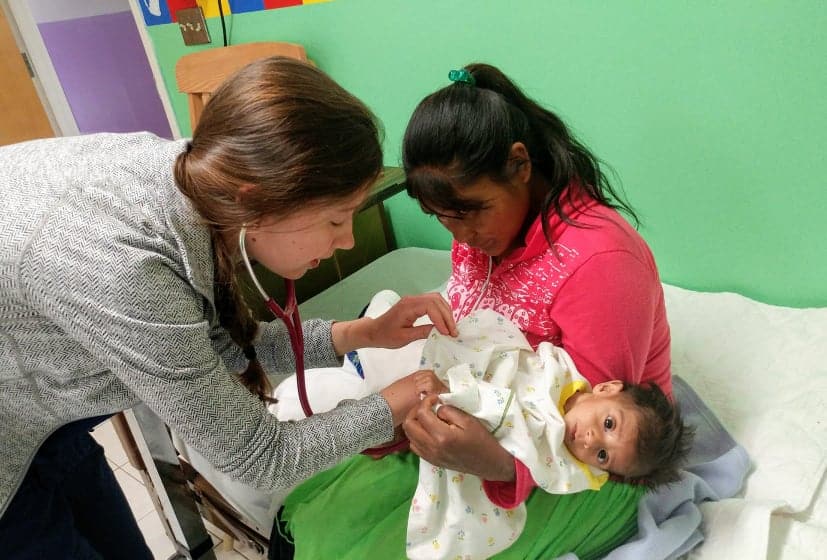
After working for three years as a nurse at a large teaching hospital in Dallas, Haley McNeese (’17) was well-versed in her chosen profession.
But she still faced a steep learning curve when she joined Christian Health Service Corps in June to serve at Hospital Mision Tarahumara, working with indigenous people in the Sierra Madre mountains of Mexico.
Part of the challenge, she said, resulted from the lack of nursing “specialties” in a small hospital.
“I have to be prepared to care for any type of patient that shows up at the hospital,” she said. “I have already worked with laboring mothers, patients with critically unstable blood pressure, children with seizure disorders or pieces of dried chicken liver lodged up their noses for a month (true story), domestic abuse cases, malnourished toddlers, trauma wound patients, people struck by lightning, newborns, and elderly end-of-life patients, among others.”
Although many of the stories are heartbreaking and leave Haley feeling powerless, these moments remind her once again “that Christ is the one who saves.”

When Haley graduated from ACU in 2017 with a degree in nursing and a minor in Spanish, she had already experienced medical missions through the university’s WorldWide Witness program. She spent the summer of 2015 as a guest of ACU alumni Dr. Will (’93) and Allison (Smith ’95) Caire, who were living in Peru as missionaries.
“They demonstrated so beautifully what it means to serve God selflessly,” Haley said, “even when immediate ‘results’ are not always evident.”
Two months after graduation, she began the nurse residency program at The University of Texas Southwestern Medical Center in downtown Dallas, where she worked for three years before joining CHSC. Among the most avid supporters of her transition to the mission field are her parents, also ACU graduates, Dr. Art (’73) and Holly (Biggers ’87) McNeese.
Since arriving in Mexico in June, Haley has seen the Holy Spirit’s work in the region in countless ways. Through her work at the hospital and nearby communities, she is beginning to grasp the history and culture of the people. Because of their isolation, Haley said, many of them speak only Tarahumara, a dialect specific to that region. Most of them live on subsistence farming, which means a poor crop yield can be devastating.
The hospital where Haley serves has a child nutrition program to help combat the nearly 50% infant mortality rate in the region. Along with serving the physical needs of the people, she said she has been burdened like never before to pray for a people who have endured such hardship and are crying out for the hope found in Christ.
She has learned that the culture retains many ancient animistic beliefs, a doctrine that teaches that every natural thing in the universe has a soul. But, Haley said, the team is beginning to see change. She was able to help load more than 600 MP3 players with audio recordings of the Bible in the native language, which were then distributed throughout the scattered mountain communities by a group of Tarahumara believers as they journeyed together on a two-week hike.
“As an unreached people group,” Haley said, “the Tarahumara are hearing the Gospel for the first time, and the truth of Christ’s presence is being made known. It has been amazing to join team members on community outreaches, seeing how God is opening their eyes.”
Her short time in Mexico has yielded many rewards.
“God continues to do beautiful work through our hospital, impacting communities in ways we couldn’t have imagined,” she said. “One young boy, the son of an influential Tarahumara leader, was treated in our emergency room last month – a fairly simple procedure. When the father saw the genuine care provided in the name of Jesus, he went from disallowing evangelical Christian teaching in his community to humbly thanking us and inviting our team to come share the Gospel among his people.”
Another young boy came in with severe malnutrition, a far too common problem in the region. “I was involved in closely monitoring this boy’s vital signs and weight, administering medications to rebalance his blood levels, and mixing and syringe-feeding him special formula based on World Health Organization guidelines,” she said. “It was remarkable to watch the change in his appearance and disposition over the week that he stayed with us, and we were able to provide education materials for the parents to better understand how to care for their son at home.”
Fortunately, the area is so isolated that COVID-19 has not become a problem there. While she tends to the physical needs of the people she encounters, she has become even more acutely aware of the importance of prayer.
“I am overwhelmed by prayer needs – here in Mexico, back in the States and across the world. And though it feels at times a heavy weight to carry, I am struck with the realization that this is exactly how I am meant to walk through life: aware of burdens that I cannot possibly carry myself,” she said.
“When I am forced to my knees by the weight of it all, lifting up the brokenness and bewilderment and heartache, Christ tells me that he has already carried the weight of the cross so that I don’t have to. He knows the pain of this world to an infinitely greater degree than I do, but he has not lost control for a single moment. In every seemingly hopeless situation, he can be trusted. And he gives me the gift of interceding for his children, of partnering in his work. He is not finished here.”
Learn more about ACU’s School of Nursing
Learn more about the WorldWide Witness program
